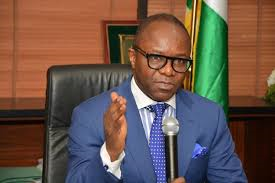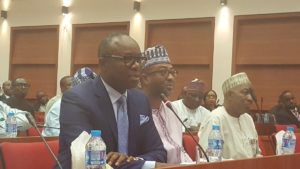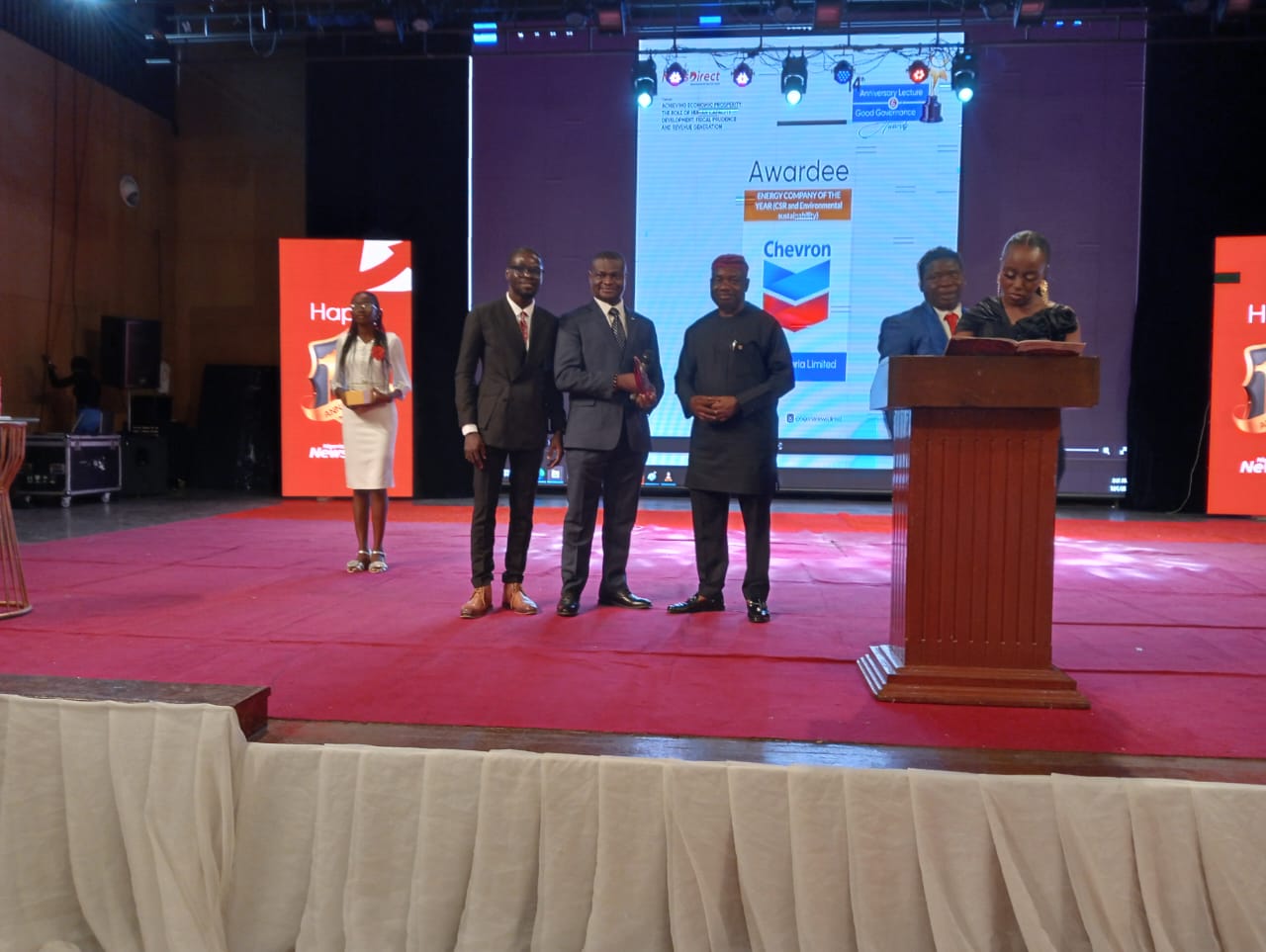Energy
PIGB: FG proposes single industry regulator

By Yemie ADEOYE
IN an effort to harmoise the controversial Petroleum Industry Governance Bill (PIGB) formerly PIB, and ensure its smooth and prompt passage by the national assembly, the federal government has proposed the concept of a single regulator for the petroleum industry.
The Minister of state for petroleum resources, Dr. Ibe Kachikwu made this known when he appeared for the stakeholder and public hearing hosted by the National Assembly Joint Committee on Petroleum Industry Governance Bill recently.

From left: The Honourable Minister of State for Petroleum Resources, Dr. Emmanuel Ibe Kachikwu; Senior Technical Adviser on Policy and Regulation to the Minister, Mr. Adegbite Adeniji; and Director, Gas Department at the Ministry of Petroleum Resources, Mr. David Hassan at the public hearing today.
According to the Minister what Nigeria needs going forward is a regulator that covers the field, as opposed to dissipated regulatory power amongst agencies. The regulator should cover upstream, midstream and downstream oil, gas and products regulation, as well as technical, economic and HSE regulation. S.8 of the PIGB provides that the Commission will issue regulations in respect of a number of specified matters in order to give proper effect to the Act.
“There needs to be careful calibration of the relationship between the role of the Minister as the institution charged with overall supervision of the industry vis a vis that of the super regulator as the institution responsible for regulation. The calibration must ensure checks and balances on regulatory power through tools such as administrative law; however, it seems essential that the power to issue regulations should at all times reside with the Minister.
This ensures that power to issue delegated legislation is placed in the hands of the appropriate member of the executive with responsibility both to the President and also to the National assembly in terms of oversight. The counter check on this is that the technical issues are handled by the regulator, for consideration of the Minister, who upon approval of the recommendation, will issue the appropriate regulation.
There are several matters in the bill that are not regulatory in nature which will require regulations. It will be an aberration if these matters, which are squarely within the purview of the Minister, to be delegated to the Commission. Minister should issue regulations upon the advice of the Commission.
A core aspect of the reforms that we propose to the effectiveness of the Minister’s powers to issue policies, supervise the industry and manage Nigeria’s petroleum resources, is the need for a well-resourced and solid technical back office. Hence, the National Oil Policy and the National Gas Policy contains proposals for institutional reforms at the Ministry of Petroleum Resources in this regard. It is our position that the PIGB should address this long standing issue legislatively by creating a Petroleum Technical Directorate.”
Kachikwu stated further that S.13 Does not envisage a position for the Minister on the Board of the Commission. We propose that the Minister Chair the Board of the Commission to ensure effective interface between the regulatory and policy making institutions. The PIGB proposes 4 year terms for Commissioners.
“May I respectfully suggest that we accord with best practice by introducing staggered terms for Commissioners this should be considered in order to ensure continuity in the governance of the Commission such that at no time would there be no executive commissioners in office.
Also An essential regulatory tool for a sector that is being liberalized is the need for the Commission to be granted competition regulatory powers, especially in light of the nature of the midstream which is network bound and has several monopoly features that need to be carefully managed, otherwise we will be substituting government monopolies with private monopolies as we liberalise the sector.
Another essential issue, going forward, is the need to establish a registry of records for all the titles to be issued and managed by the commission. This will aid public access to information, and the due diligence reviews by third parties into assets.
The composition of the board of the Commission should ensure linkages to critical and related sectors. As such, non-executive members of the commission should include the representatives from the Ministries of petroleum, power, finance and environment. Experiences from these sectors will no doubt enrich the work of the Commission.
For focus, it is recommended that from the outset the Commission should be constituted with the following departments: Upstream regulation, Midstream and Downstream Oil Regulation, Midstream and Downstream Gas Regulation, Health Safety & Environment.”
Speaking on the Government’s role on the commercial side, the minister noted that “the reforms that we commenced earlier on in the year need to be sustained through legislation. The critical issues here are governance, funding, efficiency and accountability of the commercial entities.”
The Minister further opined that A National Oil Company(NOC) needs to be created as a holding company for an integrated operation that will operate on a fully commercial basis with the following recommendations. “On Funding-A key plank of our reforms is to ensure that the national oil company is able to operate without recourse to the treasury such that funds that could otherwise be sequestrated for our upstream commitments can be deployed by the treasury to meet urgent needs in other social sectors. Ultimately, the National Oil Company needs to acquire an investment grade status if it is ever to achieve these objectives.
This will require a new way of governance and a different type of National Oil Company than currently exists. For one, it must be insulated from political interference in its operations. It must also run commercially and efficiently if it is to be able to attract funding from debt and capital markets. The governance structure and terms of reference must therefore be clearly stated and legislation must provide it a pathway to independently and sustainably raise its own funding, Hence, our recommendation is that there should be an explicit provision in the Bill that clarifies that the National Oil Company shall cease to be funded from the federation account and shall have the power to raise funding for its operations from the debt and capital markets.
The NOC should be structured as a holding company to be chaired by the Minister, The NOC to be an integrated holding company comprising semi – independent upstream, midstream and downstream with their own CEOs and Board of Directors, CEO / GMD of NOC to be appointed by the President upon the advise of the Minister , Position of CEO / GMD of the NOC to be tenured but subject to fulfilment of annual Key Performance Indicators and targets to be set by the board. The CEO / GMD of Holding Company may only be removed for failing to fulfill KPIs and for misconduct.
We have noted that the PIGB requires a lower level of experience than one would ordinarily expect for the membership into the board. We recommend that this be revisited such that the Group Managing Director should have no less than 20 years managerial experience, whilst the executive directors should have a minimum of 15 years senior management experience.
Stock exchange governance rules should apply to the NOC immediately it is incorporated right up till when it is eventually listed, and MDs of each subsidiary to sit on NOC Board.
Following best practice, independent board members should be appointed to the board. As for the subsidiaries, similar rules relating to governance and funding should apply, the main difference being that the Group Managing Director should chair the board of each subsidiary.
We also support the creation of an asset management company that will manage government’s interest in specific upstream assets that will be transferred to the company, whilst leaving the National Oil Company to operate as a refocused integrated company”.
Energy
Dangote Partnership: MRS Urges Nigerians To Insist On N935/Litre Petrol Price Nationwide

MRS Oil Nigeria Plc, a prominent player in the Nigerian downstream oil industry, has implemented a new petrol price of N935 per litre across all its retail service stations nationwide.
The company has also called on Nigerians to monitor and report any outlets that fail to adhere to the new price structure.
Biztellers reports that this is consequent upon an announcement by the President of Dangote Industries Limited, Aliko Dangote, that the Dangote Petroleum Refinery has partnered with MRS Oil and Gas to offer petrol at N935 per litre at retail outlets, following a reduction in the ex-depot price from N970 to N899.50 per litre.
ALSO READ: Dangote Slashes PMS Price To N899.50k
It was gathered that MRS Oil Nigeria Plc has instructed all its outlets to implement the new price immediately, setting up a digital platform and monitoring team to ensure full compliance.
In a statement on Monday night, the company declared, “Petrol is now being sold at N935 at MRS Filling Stations nationwide. If you find any station not following this price, please report it. Call 08009447853 or email: NG-FMKPMGWHISTLEBLOWING@NG.KPMG.COM”
Emphasising the eco-friendly nature of its products, MRS Oil added, “We call on all petrol station owners to join MRS Oil Nigeria Plc in improving the supply chain of our beloved country, ensuring product quality and availability in every corner of Nigeria for the benefit of all Nigerians.”
In Lagos, commuters were seen queuing at MRS filling stations to purchase petrol, with many expressing their gratitude to the Dangote Petroleum Refinery and MRS Oil and Gas, urging other marketers to support the indigenous refinery rather than import off-spec products into the country.
A commuter at the MRS station at Alapere on the Lagos Ibadan Express way, Ibukun Phillips, could not hide her joy as her husband filled up their car.
“I am very happy today. This is a victory for Nigeria,” she said. “The price reduction is the best gift of the season. But beyond just the reduction, we are buying standard, eco-friendly petrol at a lower rate. My husband and I have decided we will only be using MRS from now on because we are confident in the quality of the product and supporting the economy.”
A commercial bus driver, Adio Ajibade described the price reduction as a great relief, especially during the festive season.
“The reduction is a great relief. It will reduce transportation costs and benefit Nigerians. God will continue to bless Alhaji Aliko Dangote,” he said.
A public affairs analyst and university lecturer, Dr. Tunde Akanni, said the collaboration between Dangote Petroleum Refinery and MRS Oil represents a significant step towards improving the affordability, quality, and sustainability of petroleum products in Nigeria.
According to Dr. Akanni, “this move will not only help ease the financial burden on Nigerians but also promote a more environmentally conscious approach to fuel consumption, benefitting both the economy and public health in the long term.”
Energy
FDI: Shell To Invest Billions Of Dollars On Nigeria’s Bonga North Oil Field

As a direct implication of the Federal Government’s Foreign Direct Investment drive, the Royal Dutch Shell has completed the final investment decision on the deep offshore Bonga North project in Nigeria.
Biztellers reports that the Bonga North will be a subsea tie-back to the Shell-operated Bonga Floating Production Storage and Offloading (FPSO) facility which Shell operates with a 55% interest.
Shell’s Integrated Gas and Upstream Director, Zoë Yujnovich, said, “This is another significant investment, which will help us to maintain stable liquids production from our advantaged Upstream portfolio”.
ALSO READ: OGUNCCIMA Commends Dangote Refinery’s Impact
It was gathered that the Bonga North project involves drilling, completing, and starting up 16 wells (8 production and 8 water injection wells), modifications to the existing Bonga Main FPSO and the installation of new subsea hardware tied back to the FPSO.
The company is optimistic that the project will sustain oil and gas production at the Bonga facility.
The Bonga North currently has an estimated recoverable resource volume of more than 300 million barrels of oil equivalent (boe) and will reach a peak production of 110,000 barrels of oil a day, with first oil anticipated by the end of the decade.
In addition, the Bonga North will help ensure Shell’s leading Integrated Gas and Upstream business continues to drive cash generation into the next decade.
Energy
Chevron Nigeria Bags ‘Energy Company Of The Year For Environmental Sustainability And CSR

Chevron Nigeria Limited (CNL), has received an award as “Energy company of the year (2024)” for its Environmental Sustainability and Corporate Responsibility accomplishments.
The award presented by the Nigerian News Direct newspaper, on Friday December 6, 2024, and was received by Manager Communications, Chevron Nigeria and Mid-Africa Business Unit, Victor Anyaegbudike, at a colourful event at the Grand Ballroom of the Oriental Hotel, Lagos.
ALSO READ: Stakeholders Hail NCDMB As Local Content Level Hits 56%
The organizers of the award noted that Chevron has implemented the “Protecting People and the Environment” policy, which aims at preventing injuries, illnesses, and environmental incidents. They also referenced that the company has achieved 97% gas flaring reduction in its operations in Nigeria, while implementing waste management and environmental conservation programs.
According to the media organization, Chevron Nigeria has also invested millions of dollars in community development programs, supporting education, health and economic development initiatives that have benefited thousands of people, while ensuring diversity, inclusion, and employee engagement in its business operations.
Receiving the award from the Lagos State Commissioner for Information and Strategy, Gbenga Omotosho, Anyaegbudike thanked the organizers for the honour, and reiterated Chevron’s commitment to continue to develop, affordable, reliable and ever-cleaner energy that enables human progress around the world.













